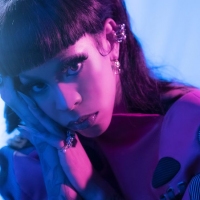 The blissful bittersweetness of EGOISM, dream-pop treasuresOn their new EP On Our Minds, Scout Eastment and Olive Rush dissect the hardships of a rough year with a sound so happy you can barely tell.
The blissful bittersweetness of EGOISM, dream-pop treasuresOn their new EP On Our Minds, Scout Eastment and Olive Rush dissect the hardships of a rough year with a sound so happy you can barely tell.

The chaos of Cry Club, the band that will never be boring
On their debut album God I’m Such A Mess, the Melbourne duo capture the mania of punk, the rush of pop, and the theatre of drag all in one.
Header images and in-article images by Giulia McGauran.
We’ve said this from the very start, and there’s no doubt that we’ll continue to shout it from rooftops for the years to come: there’s no Australian band quite like Cry Club.
When we first met in 2018, the pair - then based in Wollongong, but now based in Melbourne - were sharing their debut single Walk Away, a cathartic and explosive burst of energy that channelled the frustration and fear of the 2017 Marriage Equality Plebiscite into two-minutes-thirty of rushing, hyperactive pop-punk. “We generally love making music that you could cry and dance to at the same time,” said the duo’s vocal-half Heather Riley at the time of the single’s release, creating an ethos that would remain central to the band two years later.
Walk Away was a song that threw them into the depths of the music industry, and with that, the politics and responsibility that’s unapparent to those removed from it. On one hand, they could play sometime like BIGSOUND with just one song released, drawing attention to the band as a promising addition to Australia’s next generation (“I remember being at work, fielding calls [from management and touring agents] while I was supposed to be assisting in the studio,” reminisces the band’s other half, Jono Tooke). On the other hand, they soon found out about the quiet (sometimes less quiet) instances of bigotry and assault, and the toxic culture that remains present in music.
In the last two years, Cry Club have succeeded in being a band that can welcome the manic chaos of punk music and experimental pop music while also capturing a community that look up to them as both fans and representation. When faced with the endless queries for management representation, they aligned themselves with people they knew would stand up for everything they believed in, even if it was something they thought would further their success. They also worked on building themselves a community that, in a live show setting for example, encourages people to find freedom in themselves, while ensuring them that there’s the safety to do so. It’s the Cry Club energy; a facet of the duo that’s become almost as - if not more - important than their music.
This energy something that’s been present since the very start, but it’s something that remains a core ethos to the duo three years later, maybe even more-so. “We’ve become confident in what we want to look like and the people we want to attract,” says Heather, who as one of the few non-binary musicians present amongst Australian music’s public eye, understands the importance - how essential it really is - in creating this space for similarly-identifying and like-minded fans. “We’ve been really selective over who we align ourselves with. The team we ended up with was based on whose values aligned with ours, and the shows we’ve said yes or no to have been based on values and diversity.”
That’s just one of the ways Cry Club have grown, however. Many of the other ways are shown on their debut album God I’m Such A Mess, as 12-strong collection of tracks that aren’t so much an introduction to the band after three years of consistently boundary-pushing singles, but more of a victory lap – a celebration of their craft, and the many dimensions and facets that make Cry Club the strange and twisted, but fun-as-fuck pairing they are.
That drive to create fun, twisted music - music that can never be boring - is the other core ethos behind Cry Club, and one that’s similarly held true to the duo even as they rise through the ranks of Australia’s music space. Take some of the singles that have littered the long, two-year journey to God I’m Such A Mess, for example: DFTM – which stands for ‘don’t fucking touch me,’ - combines the pointed directness of punk music with what would’ve been the strongest pop hook of 2019 if it wasn’t for their other single Two Hearts, an open-armed embrace of pop music produced alongside someone that knows it better than anyone else: Japanese Wallpaper. They’re fierce and energetic but not so much so that it jeopardises the slickness and craft that underlay every melody; Cry Club being one of the few bands that can make impressive, bold music naturally - and actually sound like they’re having fun doing so.

In Australia, this fusion of punk energy, pop slickness, and the community - the family - that relish in Cry Club bringing these two sides together feels unlike anything else we have. But when digging into the acts that inspire them, it isn’t too hard to work out exactly where it comes from. Acts like Sonic Youth and Bring Me The Horizon inform them just as much as someone like Dorian Electra or Dylan Brady and Laura Les, the pairing that together, form hyper-experimental duo 100 Gecs. Acts like Sweater Curse and RAAVE Tapes helped Cry Club build that supportive, wholesome community - both directly and indirectly - and in terms of their theatrics and ability to turn even the most mundane aspects of being a musician to the 100, look at drag artists like Sasha Velour and Crystal Methyd; RuPaul’s Drag Race queens whose artistry inspire Cry Club, right down to the glittered teardrops underneath their eyes.
“I definitely feel like being queer is a lot of it, and the defence mechanisms you build so no-one can say that you’re boring,” explains Heather, when asked where the over-the-top theatrics of Cry Club come from. It’s about purposefully putting yourself - and things like your queerness - out there, so people can’t use it as a way to attack you or drag you down. “It’s about wearing your insecurities on your sleeve, like holding a big sign saying that you’re this particular thing, because then people can’t attack you for that particular thing - you’ve claimed it for yourself."
It’s something that fuels much of Cry Club’s work, whether it be through sonic abrasiveness, or in that aforementioned community of supportive and dedicated fans they’ve built around themselves. “The reason why we look up to someone like Sasha [Velour], is because she turns hurt and sadness into something we beautiful, and that’s something we want Cry Club to embody,” continues Heather. “I feel like it’s very clear in the trans experience too, to be upfront about the things you’re scared of, because people can’t use it against you if you embrace it yourself.”
If there’s one thing Cry Club can’t be accused of, it’s being inauthentic. Part of it surely comes from their drive to be people who - as just mentioned - wear their insecurities on their respective sleeve; you can’t really tell the genre of God I’m Such A Mess from its cover art (you’d probably guess something classical, based on their royal outfits and proper wigs), but you know it’s going to be something out there, something loud and adventurous that’s sure to catch your attention. Another part of it is them simply being themselves: “my energy has been very strange lately,” admits Heather, apologising for their chaoticness mid-interview. I’d be more alarmed if the people behind Cry Club weren’t chaotic and strange, considering that’s a distinct part of their charm.
In turn, there’s a directness present throughout God I’m Such A Mess. Cry Club know what they want to say, they know how they want to say it, and they’re going to make sure you get the message; there are very few hazy metaphors or twisting wordplay present throughout the record’s lyricism. “I’m not very metaphorical, or secretive about how I’m feeling,” admits Heather. “If we’re trying to write a song with some abstract perspective or something different that removes that personal [songwriting], it just doesn’t connect. Why would you try to make things difficult for everyone? It’s easier just to say what we mean, and I think it’s just learning to be direct with someone.”
God I’m Such A Mess is so direct at times, that it occasionally feels like snapshots of your own life, or things you’ve found in circles similar to that of Cry Club. Take DFTM’s cry of “I told you not to fucking touch me,” a pointed finger to those who invade personal space at live shows, one so sharp that it almost feels like it’s being stabbed into the perpetrator. Power-pop anthem Obvious has a line that feels like a direct drag - “My bank account is getting nervous / It can't take another purchase / Tells me ‘Bitch, you need to stay at home’” - while Nine of Swords tackles people’s unhealthy coping mechanisms, and those that blame everything bad in their lives on things like mercury being in retrograde. “Astrology, tarot cards and crystals aren’t going to replace working on bettering yourself, you’ll just continue to draw the Nine of Swords,” the band said at the single’s release.
Throughout the course of God I’m Such A Mess’ 12 tracks, the duo overcome hurdle after hurdle, tackling each one to the floor and stomping all over it - musically - once the hurdle is behind them. It’s okay to be such a mess, the band solidify; it’s okay to be angry, frustrated, to call something out. It’s something the band bring to the surface with so few muddled words that they’re proving it’s okay themselves, one song at a time.

However, Cry Club do a lot more than just provide representation for the messy folk out there, and those unsure about what they’re doing with themselves or how they’re feeling. They’re an act that gives power and strength; an act that makes sure everyone feels supported, from those that simply adore the music to those quiet, trans kids who brace the usual discomfort and anxiety to see someone like Heather Riley, sprawled over a venue floor amongst the depths of the crowd, screaming “I told you not to fucking touch me!” with such confidence that it’s hard not to just stare in awe.
There’s a whole community - a club, if you will - of people out there who value a band that can make frenzied, rushing brat-pop but make sure not to attract the over-masculine dickheads that make modern-day punk crowds so hit or miss. There’s a whole community out there who value Cry Club’s theatrics, and how they’re managed to add drag and drama to a sound that’s been done before, in order to take it into an entirely new different dimension.
When we had Heather Riley interview Dorian Electra, they talked gender euphoria and transness; how queer communities are building stan communities around pop stars that don’t fit the hyper-feminine, often-cis mould. “We’ve had so much hyper-femme pop stars, and I definitely feel like people are scared of butchness from AFAB people, or people playing on masculinity - people can get a bit weird and sensitive about it,” Heather said.
Well, things are changing. And it’s thanks to acts like Cry Club, and the manic madness that comes when they live their 100% genuine, 100% chaotic lives. Come join the club.
Cry Club's debut album God I'm Such A Mess is out now via Best & Fairest. Catch them launch the record with shows in Wollongong and Melbourne this month, more information here.
Follow Cry Club: FACEBOOK
 The blissful bittersweetness of EGOISM, dream-pop treasuresOn their new EP On Our Minds, Scout Eastment and Olive Rush dissect the hardships of a rough year with a sound so happy you can barely tell.
The blissful bittersweetness of EGOISM, dream-pop treasuresOn their new EP On Our Minds, Scout Eastment and Olive Rush dissect the hardships of a rough year with a sound so happy you can barely tell.
 Rico Nasty wants you to let it out: “I'm really big on people expressing themselves.”The DMV emcee has come a long way since her Sugar Trap beginnings, but on her debut record Nightmare Vacation, Rico Nasty fuses the old and the new with a manic smile.
Rico Nasty wants you to let it out: “I'm really big on people expressing themselves.”The DMV emcee has come a long way since her Sugar Trap beginnings, but on her debut record Nightmare Vacation, Rico Nasty fuses the old and the new with a manic smile.